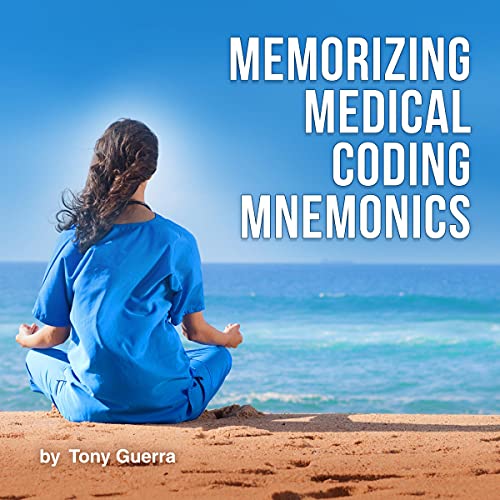
Memorizing Medical Coding Mnemonics
A Relaxed Approach Study Guide for Medical Coder (CPC) and Health Information Technology (RHIT) Students with Pharmacology and Pronunciations
Artikel konnten nicht hinzugefügt werden
Der Titel konnte nicht zum Warenkorb hinzugefügt werden.
Der Titel konnte nicht zum Merkzettel hinzugefügt werden.
„Von Wunschzettel entfernen“ fehlgeschlagen.
„Podcast folgen“ fehlgeschlagen
„Podcast nicht mehr folgen“ fehlgeschlagen
Nur 0,99 € pro Monat für die ersten 3 Monate
 Bist du Amazon Prime-Mitglied?
Bist du Amazon Prime-Mitglied?Audible 60 Tage kostenlos testen
Für 15,95 € kaufen
-
Gesprochen von:
-
Tony Guerra
-
Von:
-
Tony Guerra
Über diesen Titel
Whether you are taking the Certified Professional Coder (CPC), Certified Risk Adjustment Coder (CRC), other coding certification or moving towards your Registered Health Information Technician (RHIT) credential, there is a point where you’ll run into pharmacology, maybe as part of your coursework or in a standalone class.
Pharmacology is both a blessing and a curse. For those with a clinical background, it’s a great way for them to use what they learned in a previous or co-career and apply it to coding. For those without a clinical background, it’s a new language. I cover learning that language in the book Memorizing Pharmacology: A Relaxed Approach, but what I want to cover in this book is how to apply what you learn in pharmacology to the challenges you’ll face in your career. Whether it’s clarifying documentation in the health record, creating an accurate code assignment, improving the clinical diagnosis, diagnosis, or creating an effective yet compliant provider query, knowing a little bit of pharmacology can help immensely.
G - Coding Gastrointestinal/Digestive conditions
Coding gastroesophageal reflux disease (GERD) versus peptic ulcer disease (PUD) can come from knowing that the prescriber would not use an antibiotic for GERD, but would for 70 percent of PUD cases.
M - Coding Muscular and Skeletal conditions
When a patient has just a single medication for their arthritis like ibuprofen, it is more likely osteoarthritis. However, if they have multiple medications, including a steroid like prednisone and a disease-modifying anti-rheumatic drug like etanercept (Enbrel) we would much more likely suspect rheumatoid arthritis.
R - Coding Respiratory conditions
It’s funny how a few letters in the brand name of a medication can mean all the difference, the generic drug fluticasone with the Flonase brand name is for seasonal allergic rhinitis and over-the-counter, while fluticasone with the Flovent brand name is for asthma and by prescription only.
I - Coding Infectious Diseases
When a pediatric patient gets amoxicillin (Trimox) in the first visit then amoxicillin with clavulanic acid (Augmentin) just a few days later, you recognize that you will be coding for a very different office visit. The first would be an initial encounter, but the second, when the medication prescribed did not work because it was resistant to the original medication, would be coded very differently.
N - Coding Neurologic, Mental, Behavioral Disorders
When you see the medication Sarafem and can’t find it in the Table of Drugs and Chemicals, you’re alerted that this may be something a little different. You find the generic name, fluoxetine, is Prozac, regularly prescribed for depression. However, Sarafem is very specific, that fluoxetine is for pre-menstrual dysphoric disorder, PMDD. Or you might see Zyban, brand name for bupropion, another antidepressant, however, Zyban is for smoking cessation.
C - Coding Cardiovascular Conditions
Hydrochlorothiazide is a relatively weak diuretic, more appropriate for someone with hypertension, however, seeing furosemide (Lasix) would likely indicate congestive heart failure.
E - Coding Endocrine Conditions
A type-1 diabetic has to use insulin, however, a type-2 diabetic may use insulin, though it’s more likely they would be on an oral antidiabetic. A patient on drugs that sound similar are for very different conditions. Glucophage is for a patient who is diabetic, someone with hyperglycemia.



